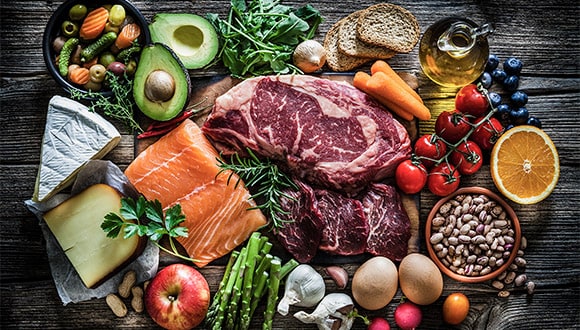Are you getting enough iron?
As nutrients go, iron is up there as one of the most essential – but many of us struggle to get enough. Here are some iron-rich foods and a refresher on why you need them.
Being tired, pale, unable to concentrate, getting headaches, or simply picking up every illness that’s doing the rounds can all be signs of iron deficiency. And given it affects approximately one third of the world’s population, it’s a pretty common health ailment.
“We all need iron; it’s essential for human health because it stores and carries oxygen around our body and produces energy,” explains Dr Anika Rouf, an accredited practising dietitian and spokesperson for Dietitians Australia. “Iron also helps boost your immune function.”
The good news is, if you are low in iron, you can turn it around with a little detective work, dietary tweaks and treatment (if you need it). Here’s what you need to know.
How much iron do we need?
The optimum iron intake can differ quite a bit, says Anika. “It depends on your age, your gender, whether you’re a woman in your reproductive years, and whether you’re pregnant. Pregnant women need about 1.5 times more iron than they normally would.”
According to Nutrition Australia, as a rule of thumb, the recommended iron levels for your family are:
- Children: kids aged 1–13 need between 8–10mg of iron per day. From 14–18, boys need 11mg per day, and girls require 15mg per day.
- Adults: Men need 8mg per day, while women in their reproductive years require 18mg per day. Between the ages of 50–70, men and women both need 8mg per day. If you’re pregnant, you need 27mg of iron per day.
Those at most risk of iron deficiency are women in their reproductive years, pregnant women, young children and those who have a vegetarian or vegan diet.

The best iron-rich foods
You can get iron from two sources – haem iron, which comes from animal products, and non-haem iron, from plant-based foods.
“Haem iron is absorbed more efficiently by the body,” says Anika, “and this would include foods like red meat, poultry, fish and chicken liver.
“Non-haem iron comes from foods like leafy green veg, tofu and legumes such as kidney beans and chickpeas. However, non-haem iron sources contain phytates, which bind to iron and carry it through the digestive tract without getting absorbed.”
Other plant-based iron-rich foods include iron-fortified breakfast cereals, eggs and nuts.
How do animal and plant-based iron rich foods stack up? You might be surprised. For example, 100g of salmon has 1.28mg of iron content, while a cup of raw spinach has 1.2mg of iron content. And a 30g serve of Weetbix has 4.2mg of iron, compared to 100g of beef, which has 3.5mg.
“You could compare iron content in steak versus in chickpeas and it wouldn’t be too different,” adds Anika, “but when it comes to absorption, your body will absorb more iron from an animal-based iron source than the plant-based one.”
Vegetarians or vegans that eat a balanced diet can still get enough iron and are not at greater risk of iron deficiency but need to plan iron intake carefully.
Improving iron absorption
Whether you’re a die-hard meat eater or a committed vegetarian or vegan, there are lots of ways to boost your iron intake and ensure you’re at a healthy level, says Anika.
“Vitamin C is an iron enhancer so a squeeze of lemon towards the end of the cooking process can help you absorb the iron better,” she explains.
“Cooking plant-based iron foods well can also enhance absorption, as can spacing out beverages like tea and coffee which can inhibit iron absorption. So you might want to wait a couple of hours after lunch before you have a cup of tea.”
Iron supplements and other treatments
Many people don’t even realise they’re iron deficient – especially as the body becomes better at absorbing iron as the stores become depleted. But if it happens to you, it’s important to work out why.
“Low iron can be down to your diet,” says Anika, “but other conditions impair iron absorption too, like coeliac disease, Crohn’s disease or ulcerative colitis.”
And if you still need to treat your low iron levels, a daily iron supplement may sort you out – or in severe cases of anaemia, you may need an iron infusion.
“This increases the body’s iron levels quickly,” says Anika. “You may need several infusions to bring you up to the optimum iron levels.”
It’s important to remember to only take iron supplements if you need them, because they can cause unnecessary digestive issues and some people can end up having too much iron in their system.
Concerned about your iron levels? Our partnership with GP2U, an online video GP service, makes it easier for eligible members to access telehealth services. All HCF members with health cover can access a standard GP consultation (up to 10 minutes) for a fee of $50. See hcf.com.au/gp2u for more information. Call us on 13 13 34 to find out more*.
Words by Rachel Smith
First published May 2021
Related articles
Is red meat bad for you?
Everything in moderation? Find out how to develop a more balanced diet.
DOES FASTING HELP YOU LOSE WEIGHT?
Various fasting diets claim you can lose weight, improve your health and potentially extend your lifespan.
6 COMMON DIET MYTHS BUSTED
We sort fact from fiction to help keep your nutrition on track.
RAISING VEGETARIAN OR VEGAN KIDS
Saying no to animal products is on the rise, but is a vegetarian or vegan diet suitable for children?